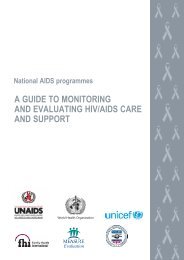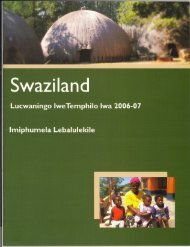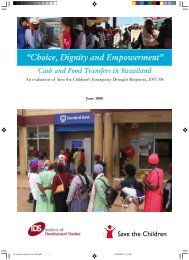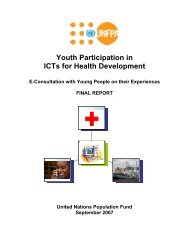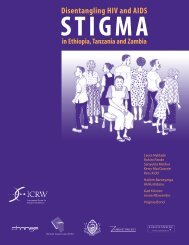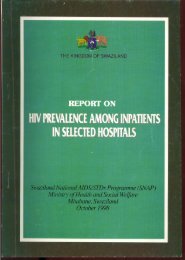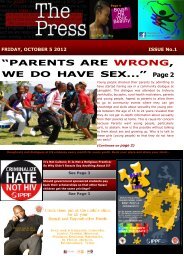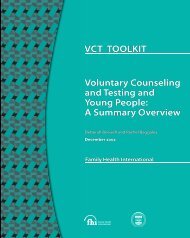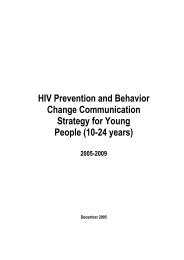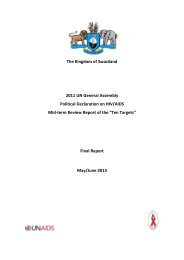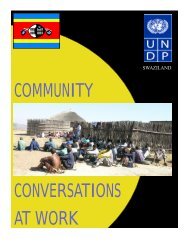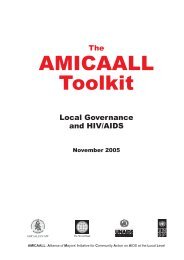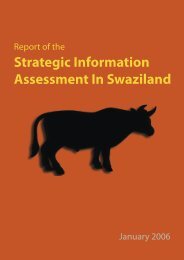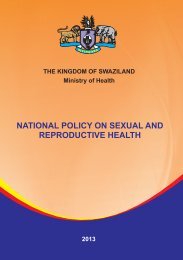HIV/AIDS+WORK Swaziland
HIV/AIDS, work and development - (NERCHA), the Info Centre
HIV/AIDS, work and development - (NERCHA), the Info Centre
- No tags were found...
Create successful ePaper yourself
Turn your PDF publications into a flip-book with our unique Google optimized e-Paper software.
C. Policy optionsDeveloping a policy response to theepidemic requires a sound knowledge of theongoing activities by the donor, and publicand private sector in the area. A number offoreign donors have been mobilized against<strong>HIV</strong>/AIDS, and the government, with the helpfrom civil society, NGOs and donors, has putin place a range of responses, interventionsand strategies to combat the spread of theepidemic and to deal with its consequences.However, little change in <strong>HIV</strong> prevalence hasbeen observed so far. Furthermore, the needto deal with the consequences of illness, deathand orphaning means that additional resourcesare needed at a time when existing capacity isbeing eroded.i National responseSwazi authorities have publicly acknowledgedthat <strong>HIV</strong>/AIDS has become a nationalcalamity. In February 1999, King Mswati IIIcalled for all sectors—public, private, andNGOs—to take action. In May 1999, the PrimeMinister launched the Cabinet Committee on<strong>HIV</strong>/AIDS, chaired by the Deputy Prime Minister,and the multi-sectoral Crisis Management andTechnical Committees (CMTC) on <strong>HIV</strong>/AIDS.The government recognized that the crisis couldnot be addressed by the Ministry of Healthalone and required a multi-sectoral strategy.The new committees will set policy directionsand manage the mobilization of resourcesfor all sectors, ensuring a more unified andcoherent national response.In addition, the SNAP (<strong>Swaziland</strong> NationalAIDS Programme) Secretariat was establishedin the Ministry of Health in 1989, with supportfrom the World Health Organization (WHO).A National AIDS Task Force has also beenestablished. The first sentinel surveillancesurvey was conducted in 1991 and subsequentsurveys have been conducted annually, exceptin 1997, because of resource constraints.The bulk of AIDS-related activities havebeen carried out by NGOs and AIDS serviceorganizations, such as:• The Family Life Association of <strong>Swaziland</strong>(FLAS), which conducts lectures on familyplanning, STIs, and AIDS in army barracks ineight sites, as well as education programmesin industry, and youth counselling;• The <strong>Swaziland</strong> AIDS Support Organization(SASO), which supports programmesbenefiting PLWHA;• The AIDS Support Organization (TASO),which provides counselling and testingservices;• The Traditional Healers’ Organization (THO),which provides <strong>HIV</strong>-prevention education;and• The NGO coalition <strong>Swaziland</strong> Network ofAIDS Service Organizations (SWANASO),which coordinates the activities of NGOsworking in <strong>HIV</strong>/AIDS.ii International responseA number of activities funded by multilateraland bilateral donors have been implemented,including the following:• UNAIDS, through the Ministry of Education,has supported the NGO -<strong>Swaziland</strong> <strong>HIV</strong>/AIDS Public Education (SHAPE) in workingwith secondary schools. Through their IECactivities, NGOs have been largely effectivein bringing information about <strong>HIV</strong>/AIDSinformation to the country. However, sexualbehavioural change and condom use havenot accompanied that information.• The Baphalali <strong>Swaziland</strong> Red Cross, incollaboration with the Ministry of Health,is working to improve the screening of theblood supply in the country.• Together with the government and theItalian Cooperation, UNAIDS is also fundingtwo pilot sites for home-based care inrural areas, involving traditional healersand community volunteers. The SalvationArmy, Hospice at Home, the CatholicChurch through Caritas, and the Swedishmissionary Mkhuzweni Health Centre arealso involved in home-based care.• GTZ has supported many <strong>HIV</strong>/AIDS-relatedcare activities and provided condoms andthe Italian Cooperation is supporting homebased care pilot projects.• The European Union (EU) supports theSHAPE <strong>HIV</strong>-prevention project in secondaryschools.• USAID, DFID and CIDA have also beenworking closely with NGOs to fight AIDS.Besides, a coordinating theme group,composed of UNAIDS with representativesfrom UNICEF, UNDP, UNFPA, WHO, andUNESCO, and chaired by WHO, supports16<strong>Swaziland</strong>: <strong>HIV</strong>/AIDS work and development



